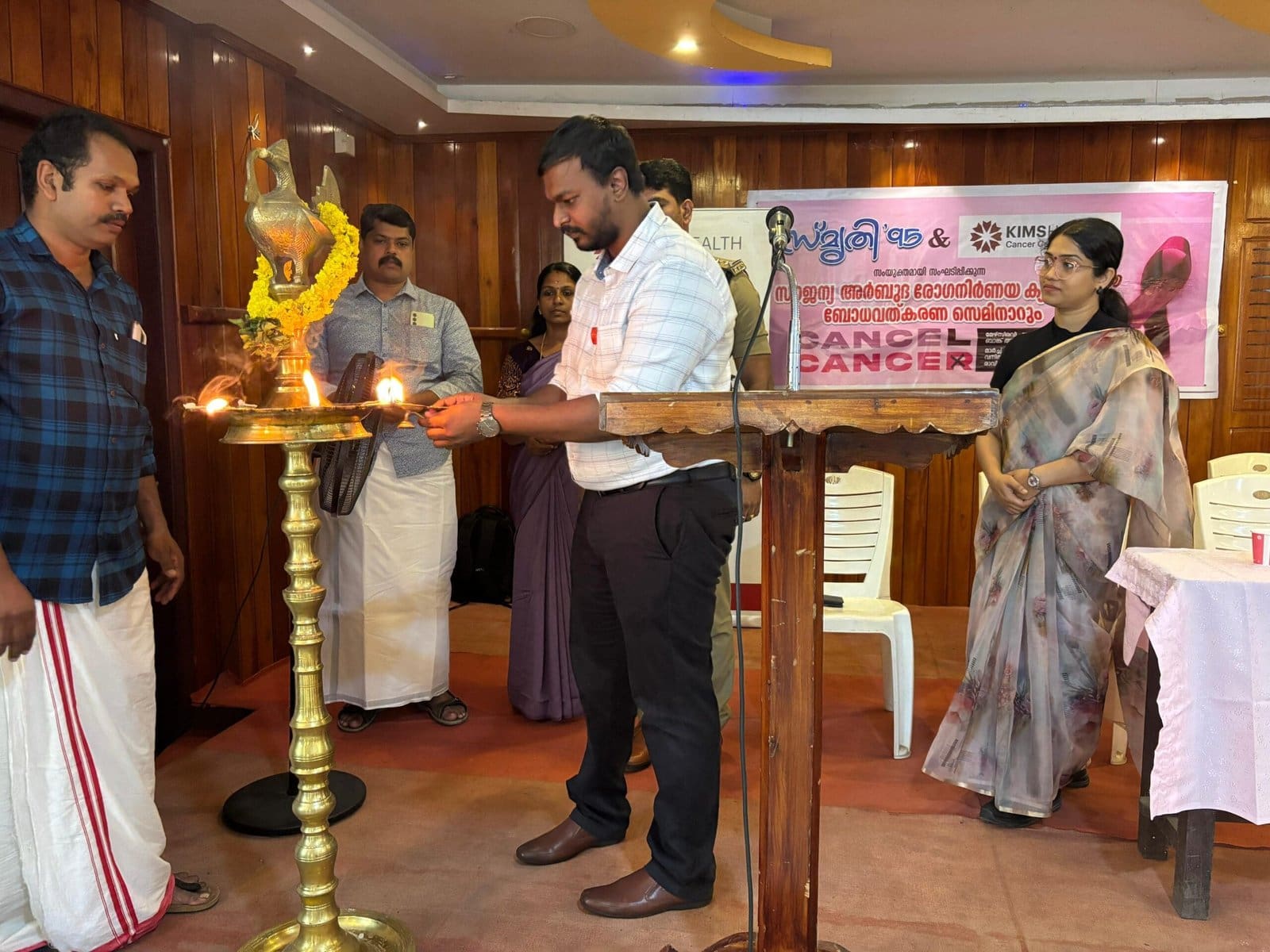Cancer is one of the leading causes of death worldwide, but not all cancers are random. In some cases, cancer can be hereditary — passed down through families due to inherited genetic mutations. Genetic testing for cancer helps identify these mutations, giving individuals and families the opportunity to take proactive steps toward prevention and early detection.
At Smrithi 95, the alumni gathering of the 1995 batch of Perumbazhuthoor Higher Secondary School held on March 8th at Neyyattinkara, I had the opportunity to speak about hereditary cancers as part of the “Cancel Cancer” campaign. The session focused on recognizing hereditary cancer patterns, identifying individuals who may benefit from genetic testing, and discussing the importance of early detection and surveillance.
What is Genetic Testing for Cancer?
Genetic testing for cancer is a medical test that looks for specific inherited mutations in your DNA that can increase your risk of developing certain types of cancer. It is usually performed using a simple blood test or sometimes a saliva sample.
Genetic testing identifies mutations in genes like:
•BRCA1 and BRCA2 – Linked to breast and ovarian cancer
•TP53 – Linked to Li-Fraumeni syndrome, which increases the risk of several cancers
•MLH1, MSH2, MSH6, PMS2 – Linked to Lynch syndrome (colorectal and endometrial cancer)
•APC – Linked to familial adenomatous polyposis (FAP), which increases the risk of colon cancer
Understanding your genetic risk can help in early diagnosis, preventive measures, and personalized treatment strategies.
Who Should Consider Genetic Testing for Cancer?
You may benefit from genetic testing for cancer if you have:
✔️ A family history of cancer at an early age (e.g., breast cancer before 50)
✔️ Multiple family members with the same or related cancers (e.g., breast and ovarian cancer)
✔️ A family member with a known genetic mutation linked to cancer
✔️ A rare type of cancer (e.g., male breast cancer)
✔️ More than one type of cancer in the same person (e.g., breast and ovarian cancer)
✔️ A personal or family history of cancers that follow a pattern (e.g., colorectal and endometrial cancer)
Why It Is Important to Consult a Geneticist
A geneticist or genetic counselor is trained to:
•Assess your personal and family history of cancer
•Recommend the right type of genetic test based on your risk factors
•Interpret test results accurately
•Guide you on next steps, including risk-reducing strategies and screening plans
•Help you understand the psychological and emotional impact of genetic testing
Genetic testing is not a one-size-fits-all approach — consulting a geneticist ensures that you get the most accurate information and the right action plan.
What Happens If Genetic Testing Is Positive?
A positive result means that you have an inherited mutation that increases your cancer risk. It does not mean you will definitely develop cancer, but it allows you to take preventive steps such as:
✅ Increased and earlier cancer screening (e.g., mammograms, colonoscopies)
✅ Lifestyle changes to reduce cancer risk (e.g., diet, exercise, smoking cessation)
✅ Considering risk-reducing surgery (e.g., mastectomy for BRCA mutations)
✅ Participation in clinical trials for high-risk individuals
How Much Does Genetic Testing for Cancer Cost?
Genetic testing for cancer costs approximately ₹25,000. Some health insurance plans may cover part or all of the cost if you meet specific criteria. A geneticist can guide you through this process.
FAQs on Genetic Testing for Cancer
1. What types of cancer can be hereditary?
Breast, ovarian, colorectal, prostate, pancreatic, and endometrial cancers are among the most common hereditary cancers.
2. How is genetic testing done?
It’s a simple blood test or saliva test that analyzes your DNA for specific mutations linked to cancer.
3. What if my genetic test is negative?
A negative test means that no known cancer-linked mutation was found. However, it doesn’t completely eliminate your cancer risk, so regular screenings may still be recommended based on your family history.
4. Can genetic testing predict when I will get cancer?
No. Genetic testing indicates an increased risk, but it cannot predict exactly if or when cancer will develop.
5. Is genetic testing painful?
No. It’s usually done with a simple blood draw or saliva sample.
6. If I test positive, should my family members get tested too?
Yes. If you have a mutation linked to hereditary cancer, close family members (parents, siblings, children) may also benefit from testing.
7. Can genetic testing help with treatment options?
Yes. Some cancers linked to genetic mutations have targeted therapies that can improve outcomes.
Take Control of Your Health with Genetic Testing for Cancer
Genetic testing for cancer empowers you with knowledge about your risk and allows you to take steps to protect yourself and your family. Early detection and proactive care can make a significant difference in outcomes.
If you think you or your family might benefit from genetic testing, consult a geneticist to explore your options. Taking this step could be life-saving!




